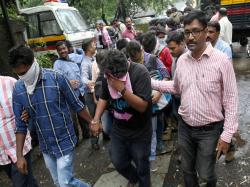Thane, Oct 8: The multi-million dollar call center racket allegedly claimed the life of an elderly American woman, who was threatened after refusing to meet the demands of the call centre employees posing as US revenue officials.
 According to Thane Police Commissioner Param Bir Singh, who is credited with exposing the racket, the probe team hit upon the vital information when it was scanning the seized call record hard disks.
According to Thane Police Commissioner Param Bir Singh, who is credited with exposing the racket, the probe team hit upon the vital information when it was scanning the seized call record hard disks.
The unidentified American national is said to have died after allegedly suffering a stroke following a threatening call by an employee, Singh told a section of media here yesterday without elaborating further.
The incident was revealed from a call record wherein the son of the woman is heard abusing the caller for the death of his mother. The probe team is trying to locate the call (its place and time) and fix the employee in question after which the police is likely to slap additional charges under section 304 of the IPC on the accused, he said.
The callers used to seek financial and bank details of US citizens and if the victims refused the information, they would allegedly threaten them with dire consequences including legal action and penalties.
The racket was exposed after city police raided three call centres, which were run illegally at the premises of Hari Om IT Park, Universal Outsourcing Services and Oswal House in Mira Road locality in Thane district, on Tuesday night.
The callers used to make calls to people in the US and conned them after speaking in American accent by posing as officials of US Internal Revenue Service.
According to police, some of the call centre employees earned up to Rs 1 lakh per month as a reward by the racket operators for making US nationals cough up money.
The employees were fully trained in US accent and were given SOP and call sheet, based on which they used to make calls to the 'tax defaulters'.
They used to make at least 100 calls per day of which 10-15 calls would materialise and of these 3-4 people would make payment under threat by the conmen, police said.
The daily turnover of these call centres is said to be to the tune of nearly Rs 1 crore to Rs 1.50 crore, and the annual turnover could be well above Rs 300 crore.
Besides arresting 70 people, Kashimira police has booked another 630 people under IPC sections 384 (extortion), 419 (cheating by impersonation), 420 (cheating) and under relevant sections of IT Act and Indian Telegraph Act.
Also, police have spread a dragnet for nabbing 12 absconding accused in the case including two directors of Universal Outsourcing Services, namely Tapan Gupta and Arjun Vasu. It is also tracing the money trail as well as gauging the quantum of the fraud. All 70 persons arrested so far are in police custody till October 10.
Besides arresting 70 people, Kashimira police has booked another 630 people under IPC sections 384 (extortion), 419 (cheating by impersonation), 420 (cheating) and under relevant sections of IT Act and Indian Telegraph Act.
Also, police have spread a dragnet for nabbing 12 absconding accused in the case including two directors of Universal Outsourcing Services, namely Tapan Gupta and Arjun Vasu. It is also tracing the money trail as well as gauging the quantum of the fraud. All 70 persons arrested so far are in police custody till October 10.






Comments
Add new comment